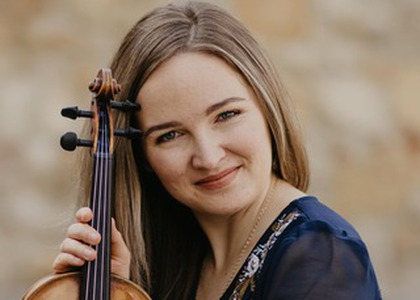> [Archived] Interviews

Interview with violinist Maria Marica (II)
On November 15th, violinist Maria Marica, winner of the 1st prize at the Enescu Competition 2022, together with pianist Daria Tudor, will give a recital at the Romanian Athenaeum in the "Musical Heirs of Romania" series proposed by Radio România Muzical, together with the Pipera Rotary Club, Artexim and the "Remember Enescu" Foundation. Tickets for this event are available here.
How do you combine soloist and chamber music and what is your favorite pose on stage?
Chamber music is where I've always felt at home, despite the fact that, especially as a teenager, I never had as much chamber music in my program as I would have liked. Maybe that's why even today I'm still looking to find myself in chamber formulas as much as possible. It is something special, not only because of the repertoire, but also from a human point of view. It's amazing what happens on stage when you're making chamber music. Of course, at the end of the day, we are also a generation that needs to know how to handle any situation; there is no longer the pure soloist, the soloist as it existed in the 20th Century. We are somehow expected to be able to play solo concerts, to be able to make chamber music, to be able to play second violin in a quartet, or to be able to play in an orchestra. We have to be flexible, to be able to adapt to different situations, and after all, music is music no matter what pose you play it from. The music comes first and should interest you first and foremost, and then, of course, the way you relate to playing an instrument or the way you adapt to the conditions you find yourself in. Of course this depends on the position you are in, but for me the music comes first. So whether it's a symphony or a sonata or a Brahms concerto, I'm happy to be on stage.
Apart from music, what do you like to do in your spare time?
I really like to go for walks. It's how I quiet my mind. That way I have time to calm down, to put my thoughts in order. I try to make as much time as possible for my friends because I realize that as time goes by, the harder it is to nurture a friendship and to genuinely care for the people around you, to give them time necessary for these interpersonal relationships. I also enjoy painting ceramics and reading.
What role do you think recordings play in the preparation of a work in a performer's career?
I think it's really important for instrumentalists to go through the recording studio every now and then because it's like a kind of spring cleaning, I would say. This experience forces you to care as much as possible about the profile of each sound. I think there are a lot of things that we pass by maybe too casually sometimes, when we're studying, that on stage can't always happen as we imagined, but the moment you're in the studio and you see yourself in front of the microphone, you realize how small the details can actually get by playing an instrument.
On the career side, I think records are important, they're our way as performers to exist in the music market, which, like it or not, exists. This is a reality and we have to exist in order to be on stage.
Translated by Ioana Radu,
University of Bucharest, Faculty of Foreign Languages and Literatures, MTTLC, year I
Corrected by Silvia Petrescu














